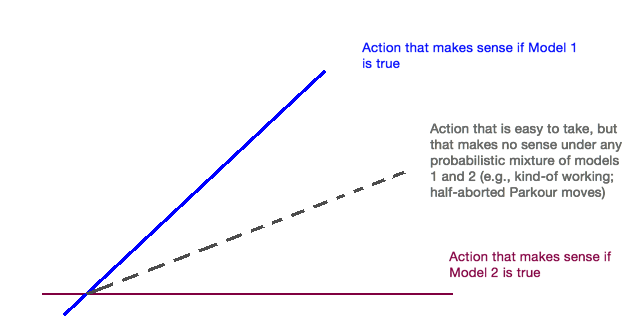Related to: Half-assing it with everything you've got; Wasted motion; Say it Loud.
Once upon a time (true story), I was on my way to a hotel in a new city. I knew the hotel was many miles down this long, branchless road. So I drove for a long while.

After a while, I began to worry I had passed the hotel.

So, instead of proceeding at 60 miles per hour the way I had been, I continued in the same direction for several more minutes at 30 miles per hour, wondering if I should keep going or turn around.

- I wasn't sure if I was a good enough writer to write a given doc myself, or if I should try to outsource it. So, I sat there kind-of-writing it while also fretting about whether the task was correct.
- (Solution: Take a minute out to think through heuristics. Then, either: (1) write the post at full speed; or (2) try to outsource it; or (3) write full force for some fixed time period, and then pause and evaluate.)
- I wasn't sure (back in early 2012) that CFAR was worthwhile. So, I kind-of worked on it.
- An old friend came to my door unexpectedly, and I was tempted to hang out with her, but I also thought I should finish my work. So I kind-of hung out with her while feeling bad and distracted about my work.
- A friend of mine, when teaching me math, seems to mumble specifically those words that he doesn't expect me to understand (in a sort of compromise between saying them and not saying them)...
- Duncan reports that novice Parkour students are unable to safely undertake certain sorts of jumps, because they risk aborting the move mid-stream, after the actual last safe stopping point (apparently kind-of-attempting these jumps is more dangerous than either attempting, or not attempting the jumps)
- It is said that start-up founders need to be irrationally certain that their startup will succeed, lest they be unable to do more than kind-of work on it...

I think for me the problem is that I'm not being Bayesian. I can't make my brain assign 50% probability in a unified way. Instead, half my brain is convinced the hotel's definitely behind me, half is convinced it's ahead, they fail to cooperate on the epistemic prisoner's dilemma and instead play tug-of-war with the steering wheel. And however I decide to make up my mind, they don't stop playing tug-of-war with the steering wheel.
My brain often defaults to thinking of these situations in terms of potential loss, and I find the CFAR technique of reframing it as potential gain helpful. For example, my initial state might be "If I go ahead at full speed and the hotel is behind me, I'll lose half an hour. But if I turn around and the hotel is ahead of me, I'll also lose time." The better state is "By default, driving at half speed might get me to the hotel in 15 minutes if I'm going in the right direction, and I'll save ~8 minutes by going faster. Even if the hotel is behind me, I'll save time by driving ahead faster."